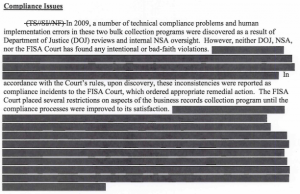As WaPo Was Letting Pincus Transcribe, They Were Fighting Administration on Gellman Story
On Friday, the President promised us more transparency on NSA issues.
Meanwhile, the WaPo was preparing this story on NSA issues from Barton Gellman.
Along the way, the Administration gave Gellman a 90-minute interview of unspecified date (it may have been Saturday, the day after Obama’s promise to be more transparent) with NSA’s Director of Compliance John DeLong only to, after the fact, ask for quote approval.
The Obama administration referred all questions for this article to John DeLong, the NSA’s director of compliance, who answered questions freely in a 90-minute interview. DeLong and members of the NSA communications staff said he could be quoted “by name and title” on some of his answers after an unspecified internal review. The Post said it would not permit the editing of quotes. Two days later, White House and NSA spokesmen said that none of DeLong’s comments could be quoted on the record and sent instead a prepared statement in his name. The Post declines to accept the substitute language as quotations from DeLong.
On August 12, the government refused to answer specific questions about compliance issues, even though Gellman had a report on them in hand.
The NSA communications office, in coordination with the White House and Director of National Intelligence, declined to answer questions about the number of violations of the rules, regulations and court-imposed standards for protecting the privacy of Americans, including whether the trends are up or down. Spokesmen provided the following prepared statement.
Then, on August 14, it offered this statement in response to specific questions about the FISA Court finding NSA to have violated the Fourth Amendment in October 2011.
In July 2012, Director of National Intelligence [James R.] Clapper declassified certain statements about the government’s implementation of Section 702 in order to inform the public and congressional debate relating to reauthorization of the FISA Amendments Act (FAA). Those statements acknowledged that the Foreign Intelligence Surveillance Court (FISC) had determined that “some collection carried out pursuant to the Section 702 minimization procedures used by the government was unreasonable under the Fourth Amendment.”
The FISC’s finding was with respect to a very specific and highly technical aspect of the National Security Agency’s 702 collection. Once the issue was identified and fully understood, it was reported immediately to the FISC and Congress. In consultation with the FISC, the Department of Justice, NSA, and the Office of the Director of National Intelligence worked to address the concerns identified by the FISC by strengthening the NSA minimization procedures, thereby enhancing privacy protections for U.S. persons. The FISC has continued to approve the collection as consistent with the statute and reasonable under the Fourth Amendment.
I’m so old I remember when President Obama promised us more transparency.
But even as the WaPo was having these ridiculous conversations with the IC about data that Gellman had in hand, Walter Pincus was writing this story.
It’s time for the intelligence community to have its side of the debate over the National Security Agency’s collection programs explained.
[snip]
Such transparency is useless if the news media do not pass it on to the public. Few, if any, major news outlets carried any of the details from the Justice and NSA papers.
[snip]
Intelligence officials say that if the U.S. media do not provide what the government claims are the facts underlying what critics and supporters say, the public cannot understand the issue.
[snip]
There are two more issues intelligence officials want noted.
That is, even while IC officials were whining to Pincus that no one was spewing their propaganda, they were playing games with Gellman to try to influence his piece while not admitting he had a handful of documents on violations that proved them wrong.
Though none of that explains what this is, from Gellman’s story.
a senior NSA official said in an interview, speaking with White House permission on the condition of anonymity.
I’m going to guess that’s DeLong. But still: why give the government their shot at rebuttal if they refuse to let their officials be accountable for their comments?

